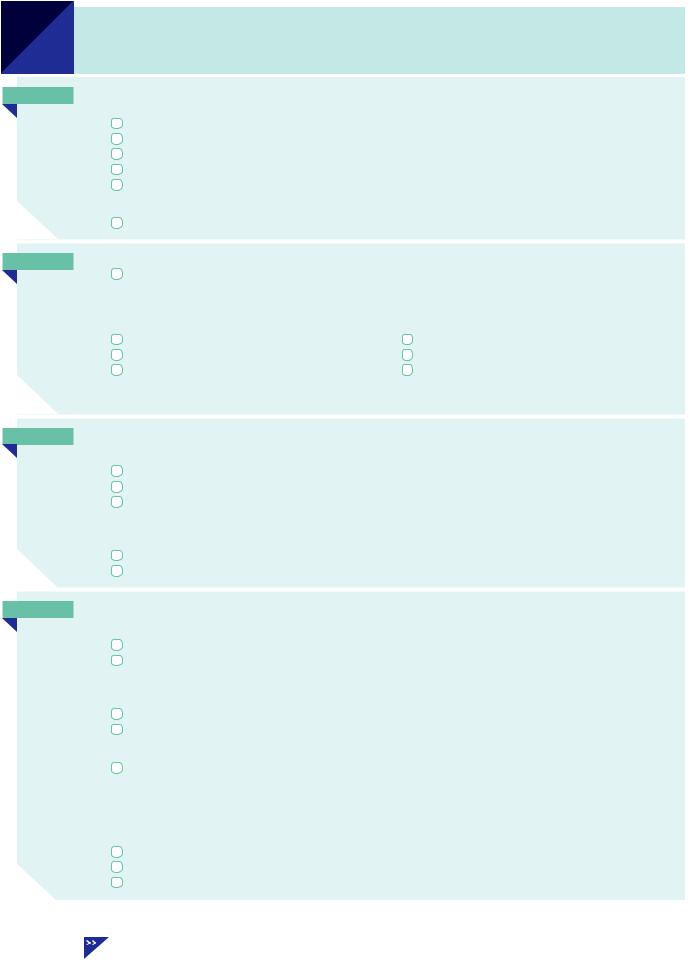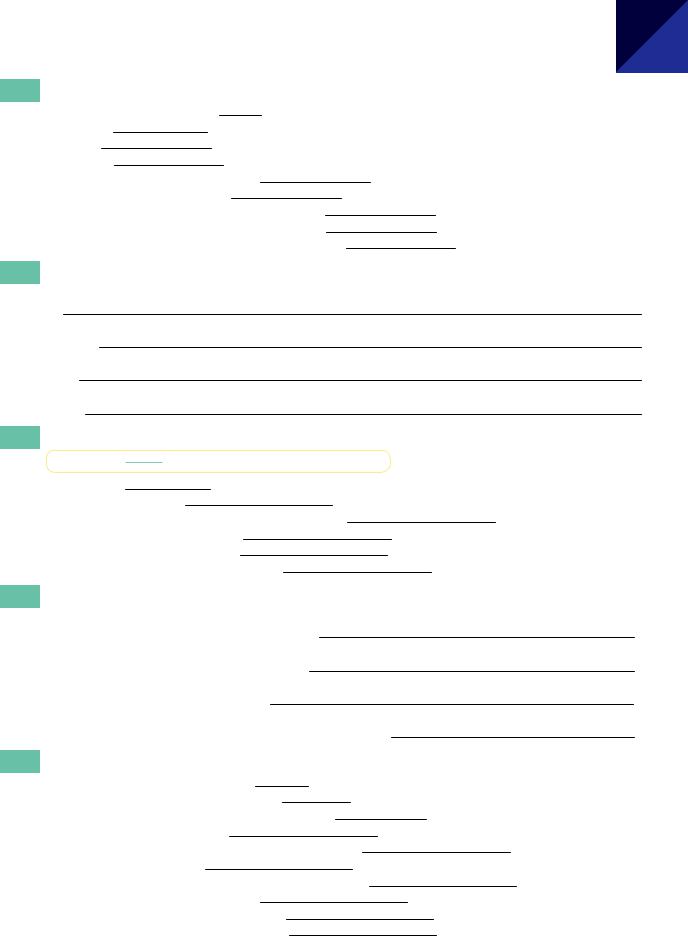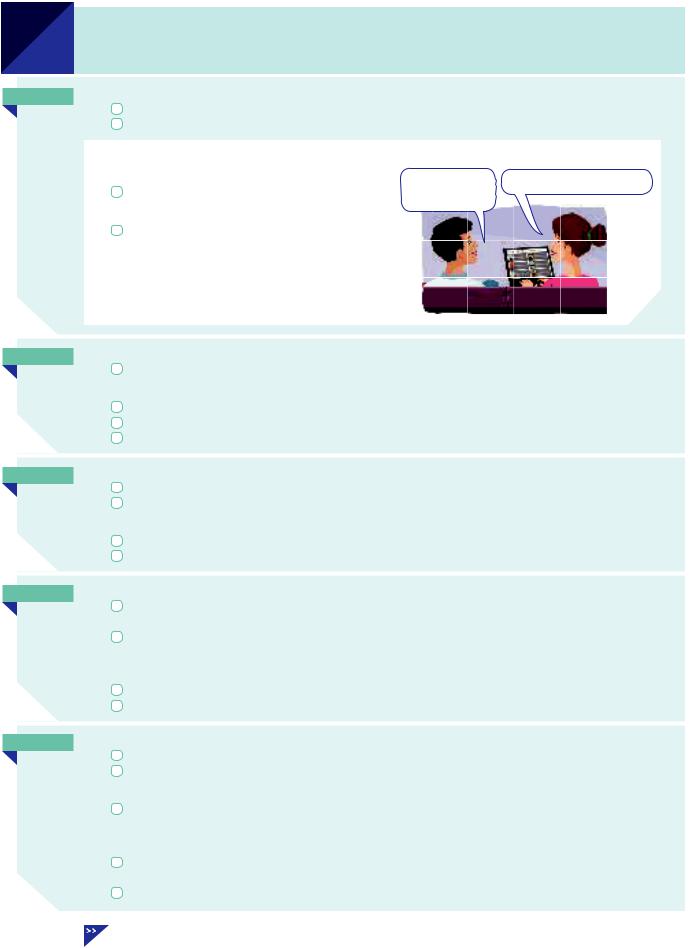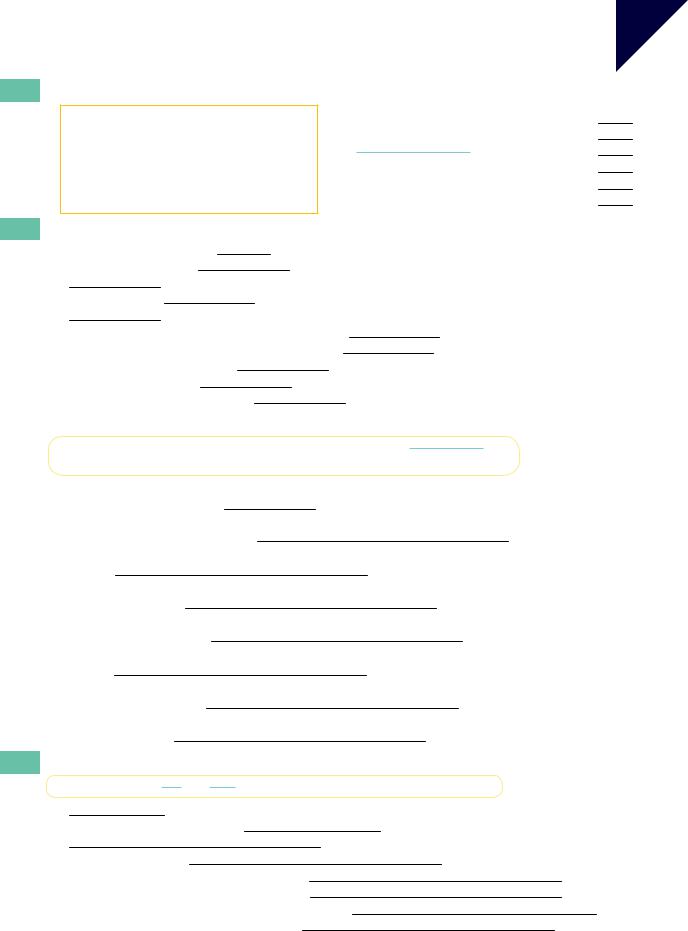
- •Contents
- •Thanks
- •To the student
- •To the teacher
- •3 Present continuous and present simple 1 (I am doing and I do)
- •10 Present perfect continuous and simple (I have been doing and I have done)
- •11 how long have you (been) … ?
- •12 for and since when … ? and how long … ?
- •13 Present perfect and past 1 (I have done and I did)
- •14 Present perfect and past 2 (I have done and I did)
- •15 Past perfect (I had done)
- •16 Past perfect continuous (I had been doing)
- •17 have and have got
- •18 used to (do)
- •19 Present tenses (I am doing / I do) for the future
- •20 I’m going to (do)
- •21 will and shall 1
- •22 will and shall 2
- •23 I will and I’m going to
- •24 will be doing and will have done
- •26 can, could and (be) able to
- •27 could (do) and could have (done)
- •28 must and can’t
- •29 may and might 1
- •30 may and might 2
- •31 have to and must
- •32 must mustn’t needn’t
- •33 should 1
- •34 should 2
- •35 I’d better … it’s time …
- •36 would
- •39 if I knew … I wish I knew …
- •40 if I had known … I wish I had known …
- •41 wish
- •42 Passive 1 (is done / was done)
- •43 Passive 2 (be done / been done / being done)
- •44 Passive 3
- •45 it is said that … he is said to … he is supposed to …
- •46 have something done
- •47 Reported speech 1 (he said that …)
- •48 Reported speech 2
- •49 Questions 1
- •52 Question tags (do you? isn’t it? etc.)
- •53 Verb + -ing (enjoy doing / stop doing etc.)
- •54 Verb + to … (decide to … / forget to … etc.)
- •55 Verb (+ object) + to … (I want you to …)
- •56 Verb + -ing or to … 1 (remember, regret etc.)
- •57 Verb + -ing or to … 2 (try, need, help)
- •58 Verb + -ing or to … 3 (like / would like etc.)
- •59 prefer and would rather
- •60 Preposition (in/for/about etc.) + -ing
- •61 be/get used to … (I’m used to …)
- •63 there’s no point in -ing, it’s worth -ing etc.
- •64 to … , for … and so that …
- •65 Adjective + to …
- •66 to … (afraid to do) and preposition + -ing (afraid of -ing)
- •67 see somebody do and see somebody doing
- •68 -ing clauses (He hurt his knee playing football.)
- •69 Countable and uncountable 1
- •70 Countable and uncountable 2
- •71 Countable nouns with a/an and some
- •74 the 2 (school / the school etc.)
- •75 the 3 (children / the children)
- •77 Names with and without the 1
- •78 Names with and without the 2
- •79 Singular and plural
- •80 Noun + noun (a bus driver / a headache)
- •81 -’s (your sister’s name) and of … (the name of the book)
- •82 myself/yourself/themselves etc.
- •83 a friend of mine my own house on my own / by myself
- •84 there … and it …
- •85 some and any
- •87 much, many, little, few, a lot, plenty
- •90 all every whole
- •91 each and every
- •92 Relative clauses 1: clauses with who/that/which
- •94 Relative clauses 3: whose/whom/where
- •95 Relative clauses 4: extra information clauses (1)
- •96 Relative clauses 5: extra information clauses (2)
- •97 -ing and -ed clauses (the woman talking to Tom, the boy injured in the accident)
- •98 Adjectives ending in -ing and -ed (boring/bored etc.)
- •99 Adjectives: a nice new house, you look tired
- •100 Adjectives and adverbs 1 (quick/quickly)
- •102 so and such
- •104 quite, pretty, rather and fairly
- •105 Comparative 1 (cheaper, more expensive etc.)
- •106 Comparative 2 (much better / any better etc.)
- •107 Comparative 3 (as … as / than)
- •108 Superlative (the longest / the most enjoyable etc.)
- •109 Word order 1: verb + object; place and time
- •110 Word order 2: adverbs with the verb
- •111 still any more yet already
- •112 even
- •114 in case
- •116 as (as I walked … / as I was … etc.)
- •117 like and as
- •119 during for while
- •121 at/on/in (time)
- •122 on time and in time at the end and in the end
- •123 in/at/on (position) 1
- •124 in/at/on (position) 2
- •125 in/at/on (position) 3
- •126 to, at, in and into
- •127 in/on/at (other uses)
- •129 Noun + preposition (reason for, cause of etc.)
- •130 Adjective + preposition 1
- •131 Adjective + preposition 2
- •132 Verb + preposition 1 to and at
- •134 Verb + preposition 3 about and of
- •135 Verb + preposition 4 of/for/from/on
- •136 Verb + preposition 5 in/into/with/to/on
- •137 Phrasal verbs 1 Introduction
- •138 Phrasal verbs 2 in/out
- •139 Phrasal verbs 3 out
- •142 Phrasal verbs 6 up/down
- •143 Phrasal verbs 7 up (1)
- •144 Phrasal verbs 8 up (2)
- •145 Phrasal verbs 9 away/back
- •Additional exercises
- •Study guide
- •Key to Exercises
- •Key to Additional exercises (see page 302)
- •Key to Study guide
- •Index

Unit
26 can, could and (be) able to
AWe use can to say that something is possible or allowed, or that somebody has the ability to do
something. We use can + infinitive (can do / can see etc.):
We can see the lake from our hotel.
‘I don’t have a pen.’ ‘You can use mine.’
Can you speak any foreign languages?
I can come and see you tomorrow if you like. The word ‘dream’ can be a noun or a verb.
The negative is can’t (= cannot):
I’m afraid I can’t come to the party on Friday.
BYou can say that somebody is able to do something, but can is more usual:
We are able to see the lake from our hotel.
But can has only two forms: can (present) and could (past). So sometimes it is necessary to use (be) able to. Compare:
|
|
|
I can’t sleep. |
|
I haven’t been able to sleep recently. |
Tom can come tomorrow. |
|
Tom might be able to come tomorrow. |
Maria can speak French, Spanish and |
|
Applicants for the job must be able to |
English. |
|
speak two foreign languages. |
|
|
|
|
|
|
CSometimes could is the past of can. We use could especially with:
see hear smell taste feel remember understand
We had a lovely room in the hotel. We could see the lake.
As soon as I walked into the room, I could smell gas.
I was sitting at the back of the theatre and couldn’t hear very well.
We also use could to say that somebody had the ability to do something, or was allowed to do something:
My grandfather could speak five languages.
We were totally free. We could do what we wanted. (= we were allowed to do)
Dcould and was able to
We use could for general ability and with see, hear etc. :
My grandfather could speak five languages.
I could see them, but not very clearly.
But to say that somebody succeeded in doing something in a specific situation, we normally use was/were able to or managed to (not could):
The fire spread quickly, but everybody was able to escape. (not could escape)
I didn’t know where Max was, but I managed to find him in the end. (not could find)
Compare:
Jack was an excellent tennis player when he was younger. He could beat anybody. (= he was good enough to beat anybody, he had the ability)
but Jack and Andy played a match yesterday. Andy played well, but Jack managed to beat him. (= he succeeded in beating him this time)
The negative couldn’t (could not) is possible in all situations:
My grandfather couldn’t swim.
I looked for Max everywhere, but I couldn’t find him.
Andy played well, but he couldn’t beat Jack.
52 |
could (do) and could have (done) Unit 27 must and can’t Unit 28 can/could you … ? Unit 37 |

Exercises
26.1 Complete the sentences using can or (be) able to. If can is not possible, use (be) able to.
1 |
Gary has travelled a lot. He can speak five languages. |
||
2 |
I haven’t been able to |
sleep very well recently. |
|
3 |
Nicole |
drive, but she doesn’t have a car. |
|
4 |
I used to |
stand on my head, but I can’t do it any more. |
|
5 |
I can’t understand Mark. I’ve never |
understand him. |
|
6 |
I can’t see you on Friday, but I |
meet you on Saturday morning. |
|
7 |
Ask Katherine about your problem. She might |
help you. |
|
8 |
You have to be careful in this part of the city. It |
be dangerous. |
|
9 |
Michael has lived in Italy a long time, so he should |
speak Italian. |
|
26.2 Write sentences about yourself using the ideas in brackets.
1 (something you used to be able to do)
I used to be able to sing well.
2(something you used to be able to do) I used
3(something you would like to be able to do) I’d
4(something you have never been able to do) I’ve
26.3Complete the sentences with can/can’t/could/couldn’t + the following:
|
believe |
come |
hear |
run |
sleep |
wait |
1 |
I’m afraid I |
can’t come to your party next week. |
|
|||
2 |
When Dan was 16, he |
|
|
100 metres in 11 seconds. |
||
3 |
‘Are you in a hurry?’ |
‘No, I’ve got plenty of time. I |
.’ |
|||
4 |
I don’t feel good this morning. I |
|
|
last night. |
||
5 |
Can you speak a little louder? I |
|
|
you very well. |
||
6 |
I was amazed when I heard the news. I |
|
it. |
|||
Unit
26
26.4 Complete the answers to the questions with was/were able to … .
1 |
a: Did everybody escape from the fire? |
|
|
b: Yes. The fire spread quickly, but everybody was able to escape |
. |
2 |
a: Did you finish your work this aternoon? |
|
|
b: Yes, there was nobody to disturb me, so I |
. |
3 |
a: Did you solve the problem? |
|
|
b: Yes, we did. It wasn’t easy, but we |
. |
4 |
a: Did the thief get away? |
|
|
b: Yes. No-one realised what was happening and the thief |
. |
26.5 Complete the sentences using could, couldn’t or managed to.
1 |
My grandfather travelled a lot. He could speak five languages. |
||
2 |
I looked everywhere for the book, but I couldn’t |
find it. |
|
3 |
They didn’t want to come with us at first, but we |
managed to |
persuade them. |
4 |
Jessica had hurt her foot and |
walk very well. |
|
5 |
There was a small fire in the kitchen, but fortunately I |
put it out. |
|
6 |
The walls were thin and I |
hear people talking in the next room. |
|
7 |
I ran my first marathon recently. It was very hard, but I |
finish. |
|
8 |
My grandmother loved music. She |
play the piano very well. |
|
9 |
We wanted to go to the concert, but we |
|
get tickets. |
10 |
A girl fell into the river, but some people |
|
pull her out. She’s all right now. |
53

Unit
27 could (do) and could have (done)
ASometimes could is the past of can (see Unit 26):
Listen. I can hear something. (now)
I listened. I could hear something. (past)
But could is not always past. We also use could for possible actions now or in the future, especially to make suggestions. For example:
a: What shall we do tonight? |
What shall we |
We could go to the cinema. |
do tonight? |
|
|
b: We could go to the cinema. |
|
|
|
|
a: When you go to Paris next month, you could stay with Sarah.
b: Yes, I suppose I could.
Can is also possible in these sentences (‘We can go to the cinema.’ etc.). Could is less sure than can.
BWe also use could (not can) for actions that are not realistic. For example:
I’m so tired, I could sleep for a week. (not I can sleep for a week)
Compare can and could:
I can stay with Sarah when I go to Paris. (realistic)
Maybe I could stay with Sarah when I go to Paris. (possible, but less sure)
This is a wonderful place. I could stay here for ever. (unrealistic)
CWe also use could (not can) to say that something is possible now or in the future:
The story could be true, but I don’t think it is. (not can be true)
I don’t know what time Lisa is coming. She could get here at any time.
Compare can and could:
The weather can change very quickly in the mountains. (in general)
The weather is nice now, but it could change later. (the weather now, not in general)
DWe use could have (done) to talk about the past. Compare:
I’m so tired, I could sleep for a week. (now)
I was so tired, I could have slept for a week. (past)
The situation is bad, but it could be worse. (now)
The situation was bad, but it could have been worse. (past)
Something could have happened = it was possible, but did not happen:
Why did you stay at a hotel? You could have stayed with me.
David was lucky. He could have hurt himself when he fell, but he’s all right.
EI couldn’t do something = it would not be possible:
I couldn’t live in a big city. I’d hate it. (= it wouldn’t be possible for me)
Everything is fine right now. Things couldn’t be better.
For the past we use couldn’t have … (= would not have been possible):
We had a really good holiday. It couldn’t have been better.
Note that ‘I couldn’t do something’ has two meanings:
(1) I couldn’t = it would not be possible now, I would not be able:
I couldn’t run ten kilometres now. I’m not fit enough. (= I would not be able)
(2) I couldn’t = I was not able (past)
I couldn’t run yesterday because I’d hurt my leg. (= I was not able)
|
can and could Unit 26 |
couldn’t have (done) Unit 28B could and might Unit 29C |
54 |
could I/you … ? Unit 37 |
could with if Units 38C, 39E, 40D Modal verbs (can/will etc.) Appendix 4 |

Exercises |
Unit |
27 |
|
|
|
27.1 Which goes with which?
1What shall we eat tonight?
2I need to phone Vicky sometime.
3 What shall I get Ann for her birthday?
4Where shall we put this picture?
5 What would you like to do at the weekend?
6I don’t know what to wear to the wedding.
a |
We could go away somewhere. |
1 |
c |
b |
You could give her a book. |
2 |
|
c |
We could have fish. |
3 |
|
d |
You could wear your brown suit. |
4 |
|
e |
You could do it now. |
5 |
|
f |
We could hang it in the kitchen. |
6 |
|
|
|
|
|
27.2 Put in can or could.
1 |
This is a wonderful place. I |
could |
stay here forever. |
|
|
|||
2 |
I’m so angry with him. I |
|
kill him! |
|
|
|||
3 |
I |
hear a strange noise. What is it? |
|
|
||||
4 |
It’s so nice here. I |
|
|
sit here all day but unfortunately I have to go. |
||||
5 |
I |
understand your point of view, but I don’t agree with you. |
||||||
6 |
Peter is a keen musician. He plays the flute and he |
also play the piano. |
||||||
7 |
The company Amy works for isn’t doing well. She |
lose her job. |
||||||
8 |
Some people are unlucky. Life |
be very unfair. |
|
|
||||
9 |
I’ve been really stupid. I |
|
kick myself. |
|
|
|||
10 |
Be careful climbing that tree. You |
fall. |
|
|
||||
|
|
|
|
|||||
27.3 |
Complete the sentences. Choose from: |
|
|
|||||
|
|
gone |
could be |
|
could come |
|
could sleep |
|
|
|
have moved |
could have |
could have come |
could have been |
|||
1 |
a: Are you tired? |
|
|
|
|
|
|
|
|
|
b: Yes, very tired. I feel as if I |
could sleep for a week. |
|
|
|||
2 |
a: I spent a very boring evening at home yesterday. |
|
|
|||||
|
|
b: Why did you stay at home? You |
|
|
|
out with us. |
||
3 |
a: Shall I open this letter? |
|
|
|
|
|
||
|
|
b: Yes. It |
|
|
important. |
|||
4 |
a: How was your exam? Was it dificult? |
|
|
|||||
|
|
b: It wasn’t so bad. It |
|
|
|
worse. |
||
5 |
a: I got very wet walking home in the rain. |
|
|
|||||
|
|
b: Why did you walk? You |
|
|
|
taken a taxi. |
||
6 |
a: Where shall we meet tomorrow? |
|
|
|
|
|||
|
|
b: Well, I |
|
|
to your ofice if you like. |
|||
7 |
a: Does Tom still live in the same place? |
|
|
|||||
|
|
b: I’m not sure. He could |
|
|
|
. |
|
|
8 |
a: Did you go to university? |
|
|
|
|
|
||
|
|
b: No. I could have |
|
|
|
, but I didn’t want to. |
||
27.4 Complete the sentences. Use couldn’t or couldn’t have + these verbs (in the correct form):
aford |
be |
be |
live |
manage |
stand |
study |
wear |
1 |
I couldn’t live in a big city. |
I’d hate it. |
2 |
We had a really good holiday. It |
couldn’t have been |
3 |
I |
that hat. |
4 |
You helped me a lot. I |
|
5 |
The staf at the hotel were really good. They |
|
6 |
There’s no way we could buy a car now. We |
|
7 |
Jack prepared for the exam as well as he could. He |
|
8I wouldn’t like to live near the motorway. I the trafic.
better.
People would laugh at me. without you.
more helpful. it.
harder. the noise of
Additional exercises 16–18 (pages 311–13) |
55 |
